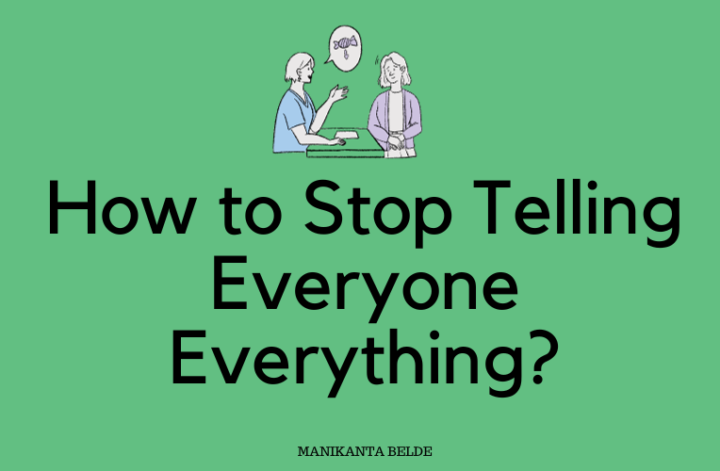Are you tired of constantly over sharing your personal information with everyone around you? Do you find yourself regretting the things you’ve said or revealed to others in the heat of the moment? If so, you are not alone.
In today’s world of social media and constant connectivity, it has become all too easy to share every aspect of our lives with the click of a button. However, this constant need for validation and attention can have negative consequences on our relationships, reputation, and overall well-being.

It’s time to take back control of what you share and with whom. In this article, you will learn effective strategies on how to stop telling everyone everything and regain your privacy and self-control.
By implementing these techniques, you can cultivate a healthier and more meaningful social circle, improve your self-image, and protect your personal information. So, if you’re ready to break the cycle of oversharing and start living a more intentional and authentic life, read on.
Learn to filter your thoughts.
When it comes to sharing our thoughts and experiences, it’s important to exercise caution and learn to filter what we say. Often, in our eagerness to connect with others or seek validation, we may overshare or disclose too much personal information. However, it’s essential to remember that not everyone needs to know every detail of our lives.
Learning to filter your thoughts allows you to protect your privacy, maintain healthy boundaries, and cultivate more meaningful relationships. Before sharing something, ask yourself if it is necessary, relevant, and appropriate for the situation.
Consider the impact your words may have on others and whether it aligns with your values and goals. By being intentional with what you share, you can cultivate a sense of self-respect and create deeper connections based on trust and mutual understanding.
Think before you speak.
In our fast-paced and interconnected world, it’s easy to fall into the habit of speaking without thinking about the consequences. However, taking a moment to think before you speak can save you from potential misunderstandings and hurtful situations.
Consider the impact your words may have on others and how they align with your values and intentions. Reflect on whether your words are necessary, kind, and helpful. By practicing the habit of thinking before you speak, you can prevent unnecessary conflicts, maintain positive relationships, and be seen as a thoughtful and considerate person. Remember, words hold power, so use them wisely.
Consider the consequences first.
Before sharing every detail of your life, it’s crucial to consider the consequences first. Ask yourself if the information you’re about to divulge is truly necessary and if it aligns with your desired image and privacy boundaries. Sharing personal information with everyone can lead to potential misunderstandings, unwanted attention, or even compromise your safety.
Take a moment to assess who really needs to know the information and whether it serves a purpose in the context of the conversation. By being selective and mindful about what you share, you can build stronger relationships, maintain your privacy, and protect yourself from unnecessary risks.
Practice the art of discretion.
When it comes to opening up to others, practice the art of discretion. It’s important to remember that not everyone needs to know every detail of your life. Before blurting out personal information, take a moment to evaluate whether it is necessary or relevant to the conversation at hand. Consider the potential consequences of oversharing, such as compromising your privacy or inviting unwanted opinions and judgments.
By being mindful of what you reveal and to whom, you can maintain a sense of control over your personal narrative and protect yourself from the pitfalls of oversharing. Remember, it’s okay to keep certain aspects of your life private and save them for those who truly deserve your trust.
Only share what is necessary.
When it comes to sharing personal information, it’s important to exercise caution and only share what is necessary. Before divulging details about your life, ask yourself if it serves a purpose or adds value to the conversation. Consider whether the information is relevant to the topic at hand or if it could potentially compromise your privacy.
By practicing discretion and being selective in what you share, you can maintain a sense of control over your personal boundaries. Remember, it’s not about withholding information, but rather being mindful of what you disclose and choosing to share with trusted individuals who will appreciate and respect your openness.
Overall, it’s important to remember that oversharing can have negative consequences on your relationships and personal well-being. By following these tips, you can learn to stop telling everyone everything and instead find a healthy balance between sharing and keeping things private.
Remember to practice self-awareness and think before you speak, and you’ll gradually become more comfortable with setting boundaries and protecting your personal information. With some effort and mindfulness, you can improve your communication skills and build stronger, more trusting connections with those around you.




